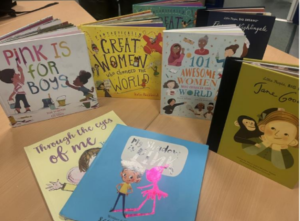To celebrate our ‘People and Places’ Conference 2024, read how the school’s history timeline received a revamp.
Hayley Lockett, Gender Champion at Packmoor Ormiston Academy tells us more…
At Packmoor Ormiston Academy, we were excited to take part in the Lifting Limits programme. The programme asked staff to look at everything they do through a gender equality lens – considering how resources, the school environment and language might reinforce harmful stereotypes.
How our priorities were identified
The gender champion began by asking curriculum leaders to look at their subject – the planning, delivery and content – to see whether gender stereotypes were being reinforced by going unnoticed or not being challenged.
This empowered teachers to find areas where they could improve their subject.
They discovered that the science, art and history curricula focused predominantly on the achievements of men, sending powerful messages to children about what they might aspire to, or not.
Our Priorities
History timeline

The history timeline, which ran the length of the school’s main corridor, was heavily represented by male historical figures.
The positive impact of this resulted with the timeline being refreshed with photos and information provided from Lifting Limits‘ resource pack, highlighting the contributions of women who had previously been neglected. Lessons linked to the female figures on the timeline were then taught using lesson plans from the LL resource pack.
.
“Before Lifting Limits, I don’t think we’d have noticed, Lifting Limits really opened our eyes to the inequalities – inequalities that we couldn’t unsee.”
H Lockett
Nursery Environment

We found that expectations are placed on our children from an early age through colour coding (pink for a girl and blue for a boy). At Packmoor, our nursery staff found these gendered expectations were already hindering boys when they spent several days observing children and discovered boys were not using the reading area. We were shocked when we discovered the reason.
“It was nicely set up, with lots of bright, colourful books and the nursery teacher asked boys why they weren’t using it.” Sharon May Head teacher.
They said: “It’s got a pink chair and girls sit on pink chairs.”
Lots of teaching throughout the year focused on explaining and reinforcing to our children that pink can be for boys too.
The area has since been changed – and has a more neutral colour where both boys and girls access equally. Nursery staff have shared positive stories to tackle stereotypes and to promote female role models through their “People Who Help Us” topic. Children have been exposed to examples of female firefighters, construction workers and surgeons and equally male hairdressers and nurses.
Classroom books

Pupil Gender Champions met to discuss findings from the audit. They concluded that there were not enough books in school that challenged gender stereotypes or promoted gender equality. The champions then researched the books that they would like to purchase, which included gender equality, diversity and inclusion. They wrote a letter and presented their suggestions to the Parent Teacher Friends Association (PTFA) asking for funding for the chosen books.
Impact
As a result of the Lifting Limits programme, gender equality is embedded into everyday life at our academy. Our curriculum, ethos and routines equip staff, pupils and the wider community to identify, discuss and challenge inequalities.
We have seen a change in children’s aspirations, behaviour and play choices and will continue to challenge gendered stereotypes and the limiting impact they can have for their future.
